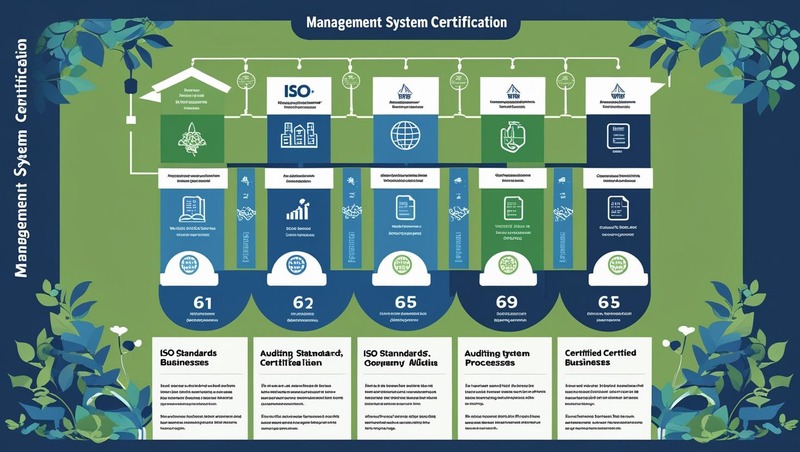Artificial Intelligence (AI) is reshaping the management system certification industry, bringing about a fundamental transformation in how audits, assessments, and compliance processes are conducted. Traditionally, management system certification — whether for ISO 9001 (quality), ISO 14001 (environment), ISO 45001 (occupational health and safety), or other standards — has relied heavily on manual inspections, paperwork, and periodic evaluations. But as businesses strive for greater efficiency, transparency, and real-time oversight, AI is emerging as a disruptive force that enhances accuracy, reduces costs, and delivers deeper insights.
One of the most significant impacts of AI in this industry is its ability to automate and optimize audit processes. Manual audits are time-consuming and prone to human error or subjectivity. AI-enabled tools can analyze large volumes of structured and unstructured data — including reports, sensor outputs, supply chain logs, and digital records — to detect non-conformities, trends, and compliance gaps with unprecedented speed and consistency. This automation reduces the time auditors spend on routine checks, allowing them to focus on higher-value tasks such as root cause analysis and corrective action planning.

AI also plays a crucial role in continuous compliance monitoring, which marks a departure from traditional periodic audits. With AI integrated into enterprise systems and Internet of Things (IoT) platforms, organizations can collect real-time data on key performance indicators (KPIs), quality metrics, environmental emissions, employee safety incidents, and more. AI algorithms monitor this data constantly, flagging potential compliance issues before they escalate. This not only strengthens the organization’s risk management capabilities but also supports the shift toward predictive and preventive certification models.
Another important transformation brought by AI is in the realm of document review and intelligent data extraction. Certification bodies and auditors must review vast numbers of policies, procedures, manuals, and records. AI-powered natural language processing (NLP) tools can scan and analyze documents rapidly, extracting relevant information, checking for consistency with standards, and identifying missing or outdated elements. This significantly reduces the administrative burden on both auditors and organizations, speeding up the overall certification process.
AI also enhances remote auditing and virtual assessments, which gained prominence during the COVID-19 pandemic and are now becoming standard practice. With AI, virtual site visits can be supported by video analytics, digital twins, and real-time data feeds. For example, AI-enabled video systems can analyze live footage from production floors or warehouses to verify compliance with safety protocols or hygiene standards. This not only broadens the reach of certification bodies but also ensures that remote assessments are as thorough and effective as on-site audits.
Risk-based auditing, a growing trend in the industry, is also benefitting from AI integration. AI algorithms can assess historical performance, incident records, and industry benchmarks to identify high-risk areas within an organization. This helps auditors allocate their time and resources more efficiently, focusing their efforts on areas most likely to pose compliance or safety risks. As a result, certifications are becoming more robust, targeted, and tailored to the unique risk profile of each organization.
From a strategic perspective, AI is driving data-driven decision-making in management system certification. Certification bodies and accredited organizations can use AI-generated insights to identify systemic weaknesses, optimize processes, and align compliance strategies with business goals. Over time, this shifts certification from a regulatory exercise to a value-adding function that supports continuous improvement, competitiveness, and stakeholder trust.
Furthermore, AI is helping ensure integrity and transparency in the certification process. With the increasing use of blockchain technology alongside AI, digital certificates can be securely stored, validated, and shared across stakeholders, reducing the risk of fraud or manipulation. AI can also detect anomalies or inconsistencies across different certification records, helping accreditation bodies uphold high standards of credibility and accountability.
Explore In-Depth Semiconductor & Electronics Market Research – https://www.marketsandmarkets.com/semiconductorand-electonics-market-research-87.html
Frequently Asked Questions (FAQs) on the Management System Certification Market
What is the management system certification market?
The management system certification market involves services provided by third-party organizations to assess and certify that an organization’s management systems comply with international or industry standards like ISO 9001, ISO 14001, ISO 45001, and others.
Why do organizations pursue management system certification?
Certification helps improve operational efficiency, ensure compliance with regulations, build stakeholder trust, enhance reputation, and gain competitive advantage in global markets.
What are the most commonly adopted management system standards?
Popular standards include ISO 9001 (Quality), ISO 14001 (Environmental), ISO 45001 (Occupational Health & Safety), ISO 27001 (Information Security), and ISO 50001 (Energy Management).
How does artificial intelligence impact the certification process?
AI enhances the certification process through predictive analytics, automated document review, anomaly detection, remote auditing, and continuous compliance monitoring, improving both speed and accuracy.
What role do certification bodies play in the market?
Certification bodies such as BSI, TÜV SÜD, SGS, DNV, and Bureau Veritas conduct audits, issue certificates, and ensure that organizations meet the requirements of specific standards.
Is management system certification mandatory?
While not always legally required, certification is often necessary for meeting customer expectations, qualifying for contracts, or entering regulated markets.
See The Latest Semiconductor Reports:
Test and Measurement Equipment Market by Automated Test Equipment, Spectrum Analyzers, Oscilloscopes, BERT, Modular Instruments, NDT Equipment, Machine Vision Inspection Systems and Machine Condition Monitoring System – Global Forecast to 2029
Testing, Inspection, and Certification (TIC) Market by Service Type (Testing, Inspection, Certification), Source (In-house, Outsourced), Application (Consumer Goods & Retail, Agriculture & Food, Chemical, Energy & Power) – Global Forecast to 2030